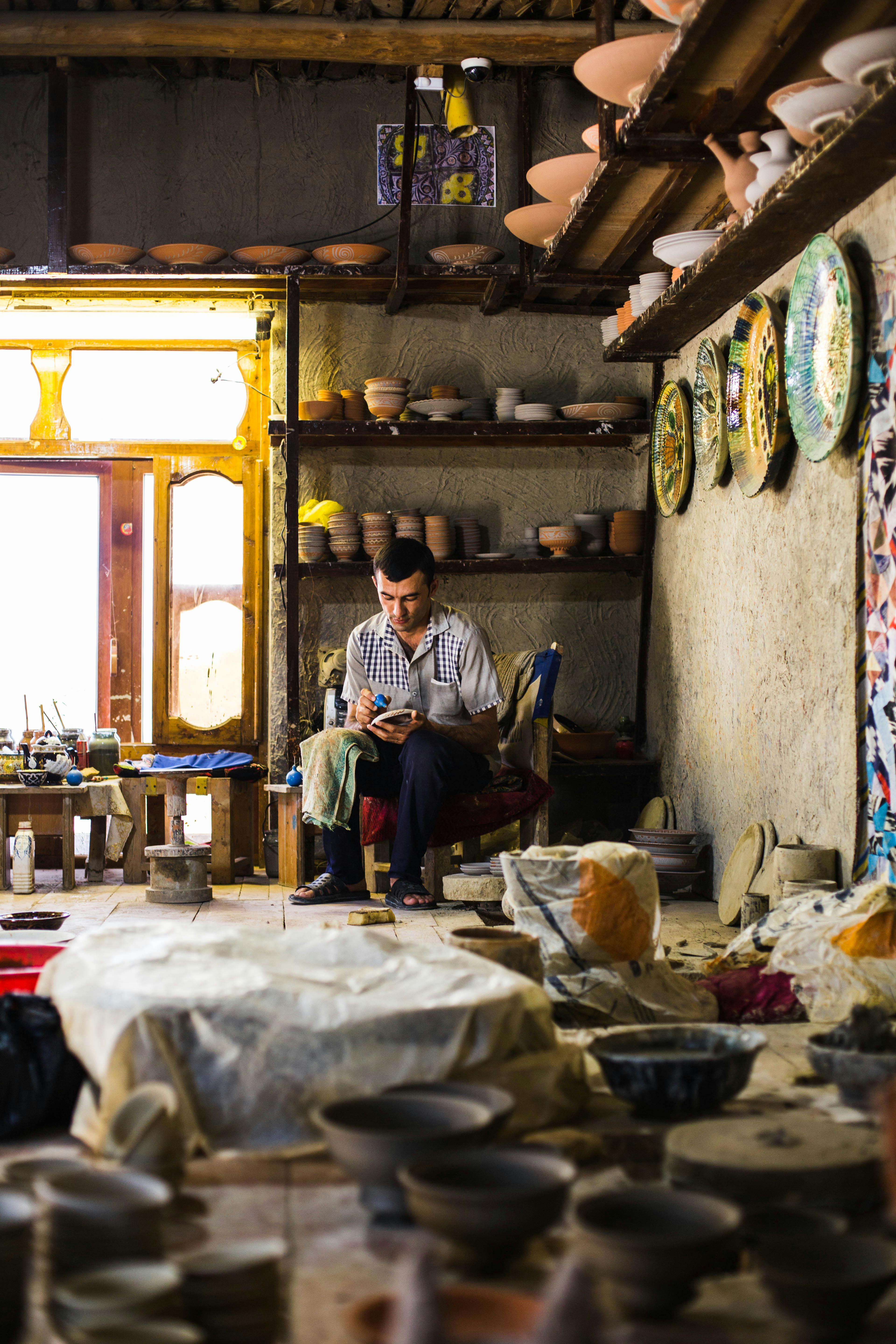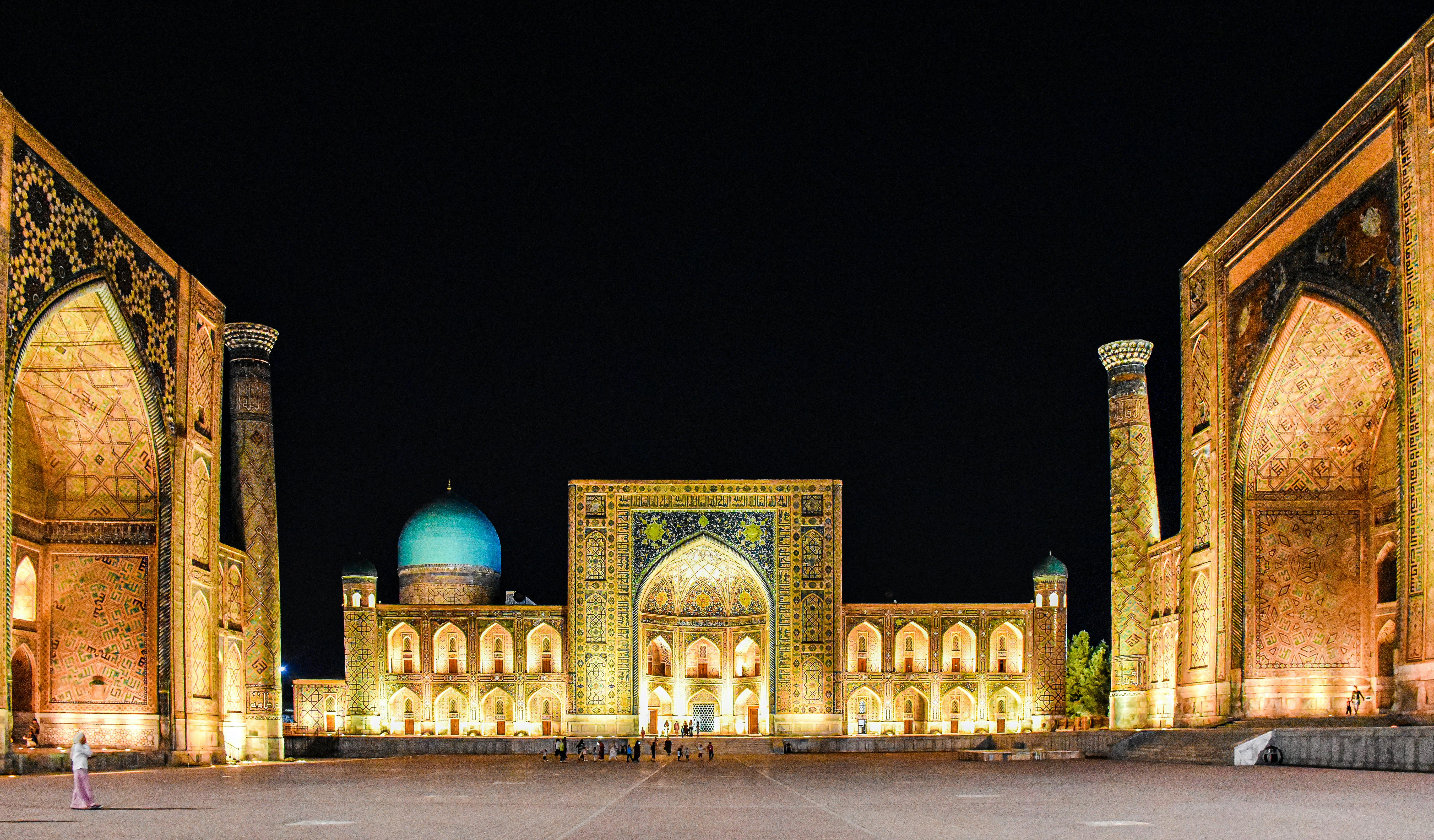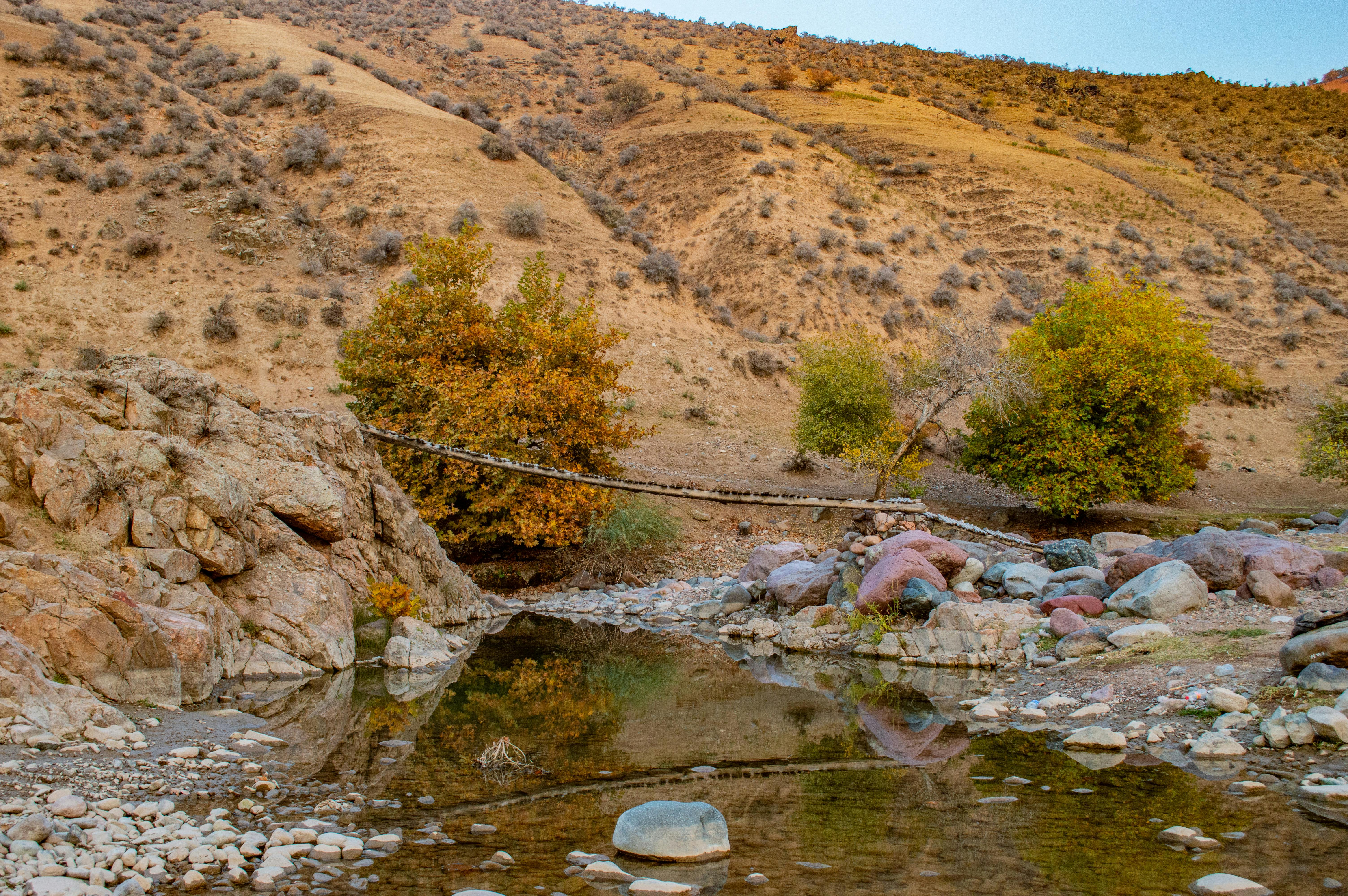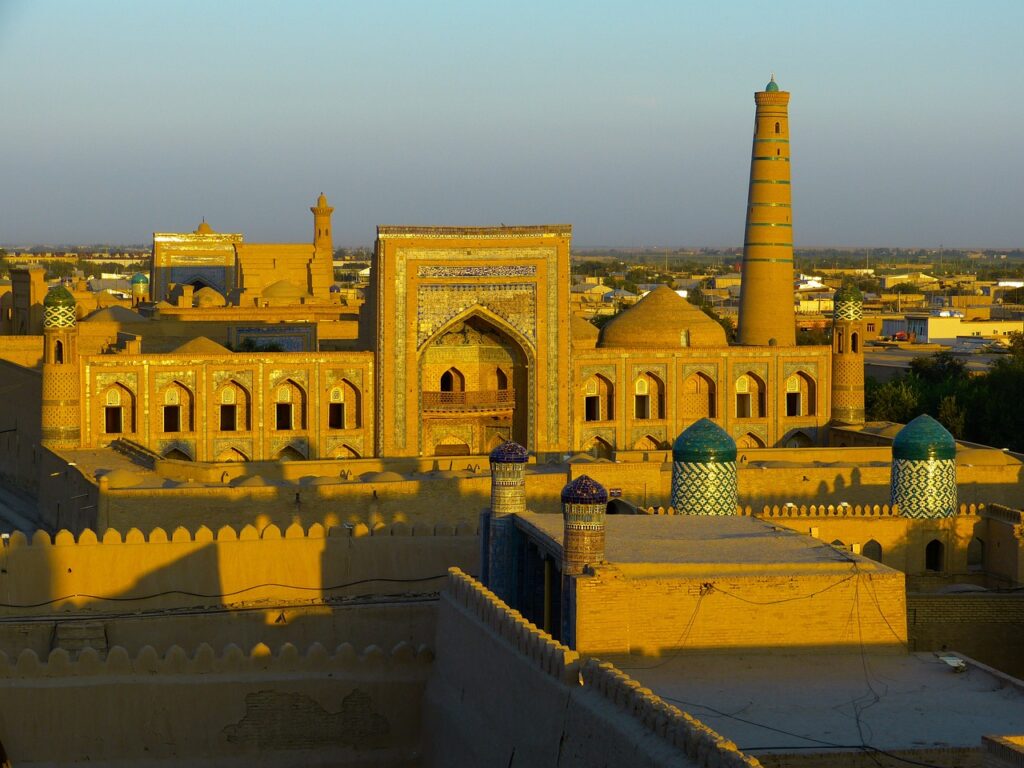Tucked away in the heart of Central Asia, Uzbekistan is a mix of ancient history, vibrant culture, and breathtaking natural beauty. From the majesty of Samarkand’s mosques and madrasahs to the bustling bazaars of Bukhara, this fascinating country is a backpacker’s haven. Yet, exploring Uzbekistan doesn’t have to break the bank! I backpacked through this incredible country, poor as a backpacker could be, only to discover some of the best-kept secrets, delicious street food, and a lot of warm-hearted locals taking me under their wing. In this blog, I will share with you my best tips, tricks, and tales from the road showing you ways of experiencing the magic of Uzbekistan without breaking the bank. Come with me, therefore, on this journey into the unknown and get ready to fall in love with one of the world’s most incredible destinations-on a broke budget!
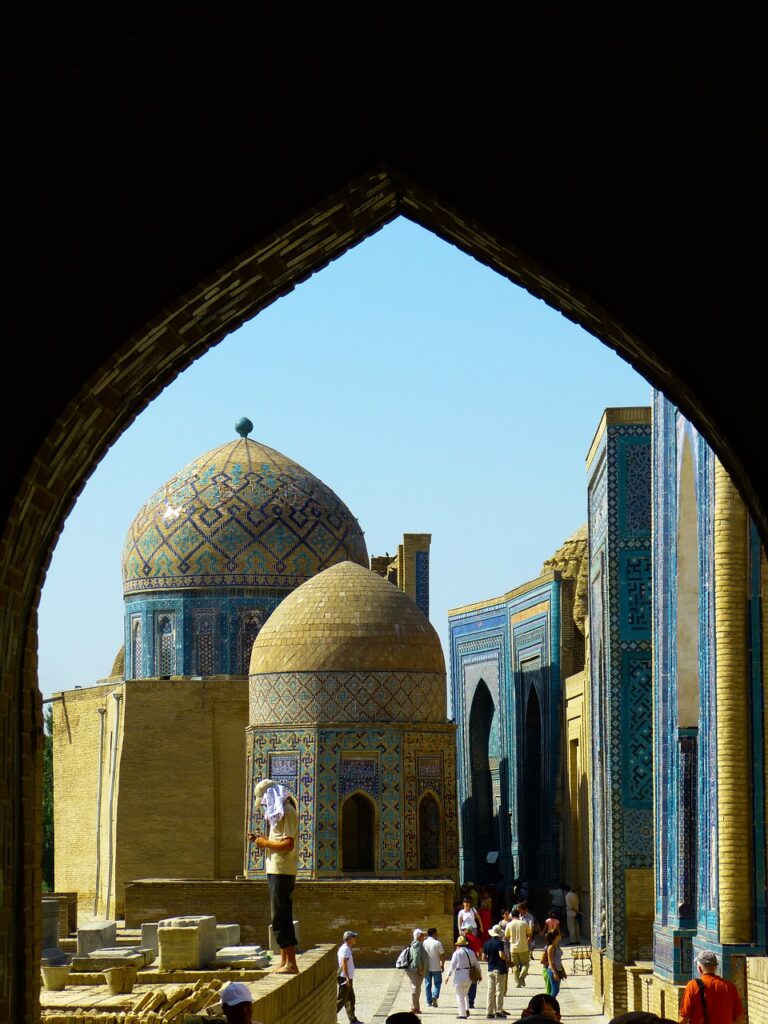
How to get there:
While flying might be the quickest way to reach Uzbekistan, If your in a nearby country its almost always cheaper and definitely way more fun to cross over borders without flying.
From Kazakhstan
- Bus: Take a bus from Almaty (Kazakhstan’s largest city) to Tashkent (Uzbekistan’s capital) with companies like Almaty-Tashkent Avtovokzal or Samarkand-Tashkent Avtovokzal. The journey takes around 20-24 hours and costs approximately 10-15 USD.
- Train: You can also take a train from Almaty to Tashkent with Kazakhstan Railways. The journey takes around 30-40 hours and costs approximately 20-30 USD.
From Kyrgyzstan
- Bus: Take a bus from Bishkek (Kyrgyzstan’s capital) to Tashkent with companies like Bishkek-Tashkent Avtovokzal or Osh-Tashkent Avtovokzal. The journey takes around 18-22 hours and costs approximately 15-20 USD.
- Shared Taxi: Alternatively, take a shared taxi (marshrutka) from Bishkek to Osh (Kyrgyzstan) and then another from Osh to Andijan (Uzbekistan). From Andijan, take a bus or taxi to Tashkent.
From Tajikistan
- Bus: Take a bus from Dushanbe (Tajikistan’s capital) to Samarkand (Uzbekistan) with companies like Dushanbe-Samarkand Avtovokzal. The journey takes around 10-12 hours and costs approximately 10-15 USD.
- Shared Taxi: Alternatively, take a shared taxi from Dushanbe to Penjikent (Tajikistan) and then another from Penjikent to Samarkand.
From Turkmenistan
- Bus: Take a bus from Ashgabat (Turkmenistan’s capital) to Bukhara (Uzbekistan) with companies like Ashgabat-Bukhara Avtovokzal. The journey takes around 6-8 hours and costs approximately 10-15 USD.
- Train: You can also take a train from Ashgabat to Bukhara with Turkmen Railways. The journey takes around 8-10 hours and costs approximately 15-20 USD.
When to go:
Spring (March to May)
- Weather: Mild temperatures, ranging from 15°C to 25°C (59°F to 77°F)
- Pros: Fewer tourists, lower prices, and beautiful blooming flowers
- Cons: Some attractions might still be closed after the winter season
- Budget tips: Take advantage of shoulder-season prices for accommodations and tours. Enjoy the festive atmosphere during the Navroz (Nowruz) celebrations in March.
Summer (June to August)
- Weather: Hot and dry, with temperatures often reaching 40°C (104°F)
- Pros: Longer days, vibrant festivals, and access to high-altitude trekking routes
- Cons: Peak tourist season, higher prices, and sweltering heat
- Budget tips: Look for accommodations with air conditioning or fans to stay cool. Consider visiting the Fergana Valley or the Tian Shan mountains for a cooler climate.
Autumn (September to November)
- Weather: Comfortable temperatures, ranging from 10°C to 20°C (50°F to 68°F)
- Pros: Harvest festivals, fewer tourists, and stunning autumn foliage
- Cons: Some attractions might start closing for the winter season
- Budget tips: Enjoy the festive atmosphere during the harvest festivals. Take advantage of shoulder-season prices for accommodations and tours.
Winter (December to February)
- Weather: Cold, with temperatures often dropping below -10°C (14°F)
- Pros: Skiing and snowboarding opportunities, hot springs, and a serene winter landscape
- Cons: Many attractions and roads might be closed due to snow and ice
- Budget tips: Look for affordable ski resorts and hot springs. Consider visiting the ancient cities, which take on a serene beauty in the snow.
Special Events and Festivals
- Navroz (Nowruz): Celebrate the Persian New Year in March with traditional music, dance, and food.
- Eid al-Fitr: Experience the vibrant atmosphere during the Islamic holiday in June or July.
- Silk Road Festival: Attend the festival in September or October for a showcase of traditional music, dance, and crafts.
Best Itineraries:
1-Week Itinerary: “Silk Road Sampler”
- Day 1-2: Tashkent (explore the city, visit the Khast Imam Complex and Chorsu Bazaar)
- Day 3-4: Samarkand (marvel at Registan Square, Bibi-Khanym Mosque, and the ancient city walls)
- Day 5-6: Bukhara (wander the old town, visit the Ark of Bukhara and Kalyan Minaret)
- Day 7: Return to Tashkent for departure
2-Week Itinerary: “Uzbekistan Explorer”
- Day 1-3: Tashkent (explore the city, visit the Khast Imam Complex and Chorsu Bazaar)
- Day 4-6: Samarkand (marvel at Registan Square, Bibi-Khanym Mosque, and the ancient city walls)
- Day 7-9: Bukhara (wander the old town, visit the Ark of Bukhara and Kalyan Minaret)
- Day 10-12: Khiva (explore the ancient walled city, visit the Itchan Kala fortress)
- Day 13-14: Return to Tashkent for departure
1-Month Itinerary: “Uzbekistan Odyssey”
- Week 1: Tashkent, Samarkand, and Bukhara (explore the cities, visit top attractions)
- Week 2: Khiva, Urgench, and the Kyzylkum Desert (explore ancient cities, go desert camping)
- Week 3: Fergana Valley, Andijan, and Kokand (visit ancient cities, enjoy scenic mountain views)
- Week 4: Return to Tashkent, explore the surrounding mountains, and depart
3-Month Itinerary: “The Ultimate Uzbekistan Adventure”
- Month 1: Tashkent, Samarkand, Bukhara, and Khiva (explore the cities, visit top attractions)
- Month 2: Fergana Valley, Andijan, Kokand, and the Tian Shan mountains (visit ancient cities, enjoy scenic mountain views, and trek)
- Month 3: Explore the Aral Sea region, visit the ancient city of Merv, and return to Tashkent for departure
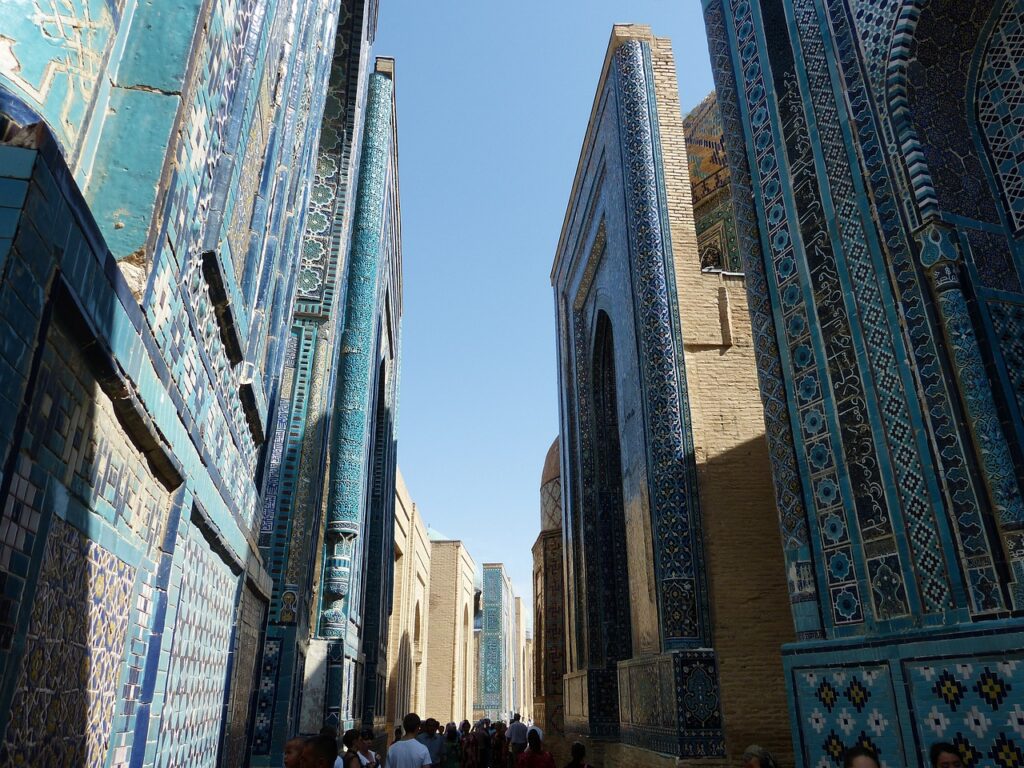
Transportation:
By Air
- Domestic Flights: Uzbekistan Airways operates flights between major cities like Tashkent, Samarkand, Bukhara, and Urgench.
- Airlines: Uzbekistan Airways, Turkish Airlines, Aeroflot, and others operate in Uzbekistan.
By Train
- Uzbekistan Railways: The national railway operator offers comfortable trains connecting major cities.
- Types of Trains:
- Fast trains (e.g., Afrosiyob): Modern, high-speed trains with air conditioning and comfortable seats.
- Express trains: Faster than local trains, with decent amenities.
- Local trains: Slower, but cheaper and more scenic.
By Bus
- Inter-city Buses: Marshrutkas (minivans) and buses connect cities, often departing from central bus stations.
- Operators: Companies like Avtovokzal, Sairam, and others operate bus services.
- Booking: Book tickets at bus stations or through operator websites.
By Taxi
- Taxis: Yellow cabs are ubiquitous in cities, but be prepared to negotiate prices.
- App-based Taxis: Yandex.Taxi and MyTaxi operate in major cities.
- Shared Taxis: Marshrutkas and shared taxis are a cheap way to travel between cities.
By Car
- Renting a Car: A bunch of different car rental options just be careful not to get scammed.
- Driving: Be prepared for chaotic traffic, especially in Tashkent. International driving permits are required.
- Road Conditions: Roads are generally good, but can be rough in rural areas.
By Bike
- Cycling: A great way to explore cities and countryside, but be aware of traffic and road conditions.
- Bike Rentals: Some companies offer bike rentals, especially in Tashkent and Samarkand.
By Camel or Horse
- Camel Rides: Experience the ancient Silk Road tradition with camel rides in the Kyzylkum Desert.
- Horseback Riding: Explore the countryside on horseback, offered by some tour operators.
Tips and Reminders
- Traffic: Be prepared for chaotic traffic, especially in Tashkent.
- Road Conditions: Roads can be rough in rural areas, and construction is common.
- Language: Russian and Uzbek are widely spoken, but English is becoming more common, especially among younger people.
Top things to do:
Tashkent Region
- Khast Imam Complex: Explore the stunning mosque, madrasah, and museum, home to the world’s oldest Quran.
- Chorsu Bazaar: Wander through the bustling market, sampling street food, and shopping for souvenirs.
- Tashkent Tower: Enjoy panoramic views of the city from the 375-meter-tall TV tower.
- Museum of Applied Arts: Discover traditional Uzbek crafts, textiles, and jewelry.
- State Museum of History of Uzbekistan: Learn about the country’s rich history, from ancient times to the present day.
- Tashkent Botanical Garden: Relax in the beautiful gardens, featuring a variety of plants and flowers.
- Abdulkasim Madrasah: Explore the 17th-century madrasah, now a museum showcasing traditional Uzbek architecture.
- Tashkent Museum of Railway Techniques: Discover the history of Uzbekistan’s railways and explore the exhibits.
- Alisher Navoi Opera and Ballet Theatre: Attend a performance at the stunning theatre, featuring traditional Uzbek music and dance.
- Tashkent Circus: Watch a spectacular show at the historic circus, featuring acrobats, clowns, and animals.
Samarkand Region
- Registan Square: Marvel at the majestic mosques, madrasahs, and ancient architecture.
- Bibi-Khanym Mosque: Explore the stunning 14th-century mosque, one of the largest in the Islamic world.
- Gur-e-Amir Mausoleum: Visit the tomb of Timur (Tamerlane), the founder of the Timurid Empire.
- Ulugh Beg Observatory: Learn about ancient astronomy and the life of Ulugh Beg.
- Shah-i-Zinda Necropolis: Discover the stunning mausoleums, featuring intricate tilework and architecture.
- Afrasiyab Museum: Explore the museum, showcasing the history and culture of the Sogdians.
- Samarkand Silk Road: Wander through the ancient streets, discovering hidden gems and local artisans.
- Khodja Ahmad Mosque: Visit the 14th-century mosque, featuring stunning architecture and tilework.
- Samarkand Botanical Garden: Relax in the beautiful gardens, featuring a variety of plants and flowers.
Bukhara Region
- Ark of Bukhara: Explore the ancient fortress, home to the Bukhara Emirs.
- Kalyan Minaret: Climb the 47-meter-tall minaret for stunning views of the old city.
- Lyab-i-Hauz Ensemble: Visit the charming courtyard, surrounded by ancient madrasahs and mosques.
- Bukhara Silk Road: Wander through the ancient streets, discovering hidden gems and local artisans.
- Char Minar: Explore the 19th-century madrasah, featuring stunning architecture and tilework.
- Bukhara Fortress: Visit the ancient fortress, now a museum showcasing the history of Bukhara.
- Sitorai Mokhi-Khosa Palace: Discover the stunning 20th-century palace, featuring intricate tilework and architecture.
- Bukhara Museum of Archaeology: Learn about the ancient history of Bukhara and the surrounding region.
- Nadir Divan-Begi Madrasah: Explore the 17th-century madrasah, featuring stunning architecture and tilework.
Khiva Region
- Itchan Kala Fortress: Explore the ancient walled city, a UNESCO World Heritage Site.
- Kunya-Ark Fortress: Visit the 17th-century fortress, home to the Khiva Khans.
- Tash Hauli Palace: Discover the stunning 19th-century palace, featuring intricate tilework and architecture.
- Khiva Bazaar: Shop for souvenirs, try local cuisine, and soak up the atmosphere.
- Pahlavon Mahmud Mausoleum: Visit the tomb of the famous poet and philosopher, Pahlavon Mahmud.
- Islam Khodja Minaret: Climb the 57-meter-tall minaret for stunning views of the old city.
- Khiva Silk Road: Wander through the ancient streets, discovering hidden gems and local artisans.
- Allakulikhan Madrasah: Explore the 19th-century madrasah, featuring stunning architecture and tilework.
- Khiva Museum of History: Learn about the ancient history of Khiva and the surrounding region.
Fergana Valley Region
- Fergana City: Explore the vibrant city, known for its ancient history, textiles, and ceramics.
- Andijan: Visit the birthplace of Babur, the founder of the Mughal Empire.
- Kokand: Discover the ancient city, featuring stunning mosques, madrasahs, and palaces.
- Fergana Mountains: Hike and trek through the scenic mountains, offering breathtaking views.
- Margilan: Explore the ancient city, known for its silk production and traditional crafts.
- Rishtan: Visit the ancient city, featuring stunning ceramics and traditional architecture.
- Fergana Valley Silk Road: Wander through the ancient streets, discovering hidden gems and local artisans.
- Akhsikent Fortress: Explore the ancient fortress, featuring stunning architecture and history.
- Kuva: Visit the ancient city, known for its traditional crafts and stunning architecture.
- Fergana Botanical Garden: Relax in the beautiful gardens, featuring a variety of plants and flowers.
Kyzylkum Desert Region
- Camel Rides: Experience the ancient Silk Road tradition with camel rides through the desert.
- Yurt Camps: Spend the night in a traditional yurt, immersing yourself in nomadic culture.
- Desert Landscapes: Explore the stunning sand dunes, canyons, and rock formations.
- Aral Sea: Visit the shrinking sea, a victim of environmental disaster.
- Kyzylkum Desert National Park: Explore the protected area, featuring unique flora and fauna.
- Syr Darya River: Visit the ancient river, which once flowed into the Aral Sea.
- Kyzylkum Desert Silk Road: Wander through the ancient streets, discovering hidden gems and local artisans.
- Yangikazgan: Explore the ancient fortress, featuring stunning architecture and history.
- Djankeldy: Visit the ancient city, known for its traditional crafts and stunning architecture.
- Kyzylkum Desert Museum: Learn about the natural and cultural history of the Kyzylkum Desert.
Food:
Gourmands will be in Seventh Heaven when it comes to trying all the traditional dishes available in Uzbekistan, strategically positioned on the Silk Road. The cuisine is a combination of Central Asian, Russian, and Middle Eastern flavors, with predominating fresh ingredients, spices, and traditional ways of cooking.
Traditional Uzbek Dishes
- Plov (Pilaf): A staple dish made with rice, meat, and vegetables, often served with raisins and nuts.
- Shurpa: A hearty soup made with lamb or beef broth, noodles, and vegetables.
- Manti: Steamed dumplings filled with meat and onions, served with sour cream and vinegar.
- Shashlik: Skewers of marinated meat (usually lamb or beef) grilled over an open flame.
- Somsa: Flaky pastry filled with meat, onions, and spices, often served as a snack or appetizer.
- Mazeda: A traditional Uzbek salad made with tomatoes, cucumbers, onions, and herbs.
- Kuyrdak: A dish made with boiled meat (usually horse meat), served with onions, potatoes, and flatbread.
Street Food and Markets
- Chorsu Bazaar (Tashkent): One of the largest and most famous markets in Uzbekistan, offering a wide range of traditional dishes, fruits, and vegetables.
- Fergana Market (Fergana): A bustling market selling fresh produce, spices, and traditional Uzbek dishes.
- Samarkand Siyob Bazaar: A historic market offering a variety of traditional dishes, including shurpa, manti, and somsa.
- Street Food: Try traditional Uzbek dishes like shashlik, somsa, and kuyrdak from street vendors and markets.
Beverages
- Green Tea: A popular beverage in Uzbekistan, often served with traditional Uzbek dishes.
- Black Tea: Strong and flavorful, black tea is a staple in Uzbekistan.
- Kompot: A sweet drink made with dried fruits, berries, and spices.
- Kvass: A fermented bread drink, popular in Uzbekistan and other Central Asian countries.
- Wine and Vodka: Uzbekistan produces a range of wines and vodkas, often made from local grapes and grains.
Dining Etiquette
- Guest Culture: In Uzbekistan, guests are considered sacred, and hosts will often go to great lengths to ensure their comfort and satisfaction.
- Table Manners: Use your right hand when eating, as the left hand is considered unclean.
- Mealtimes: Mealtimes are often seen as opportunities to socialize and bond with family and friends.
- Tipping: Tipping is not expected but is appreciated for good service.
Food Safety
- Street Food: While street food can be delicious, it’s essential to ensure that the food is cooked and handled safely.
- Water: Tap water is not always safe to drink, so it’s best to stick to bottled or filtered water.
- Fresh Produce: Fresh produce is widely available, but it’s essential to wash fruits and vegetables thoroughly before consumption.
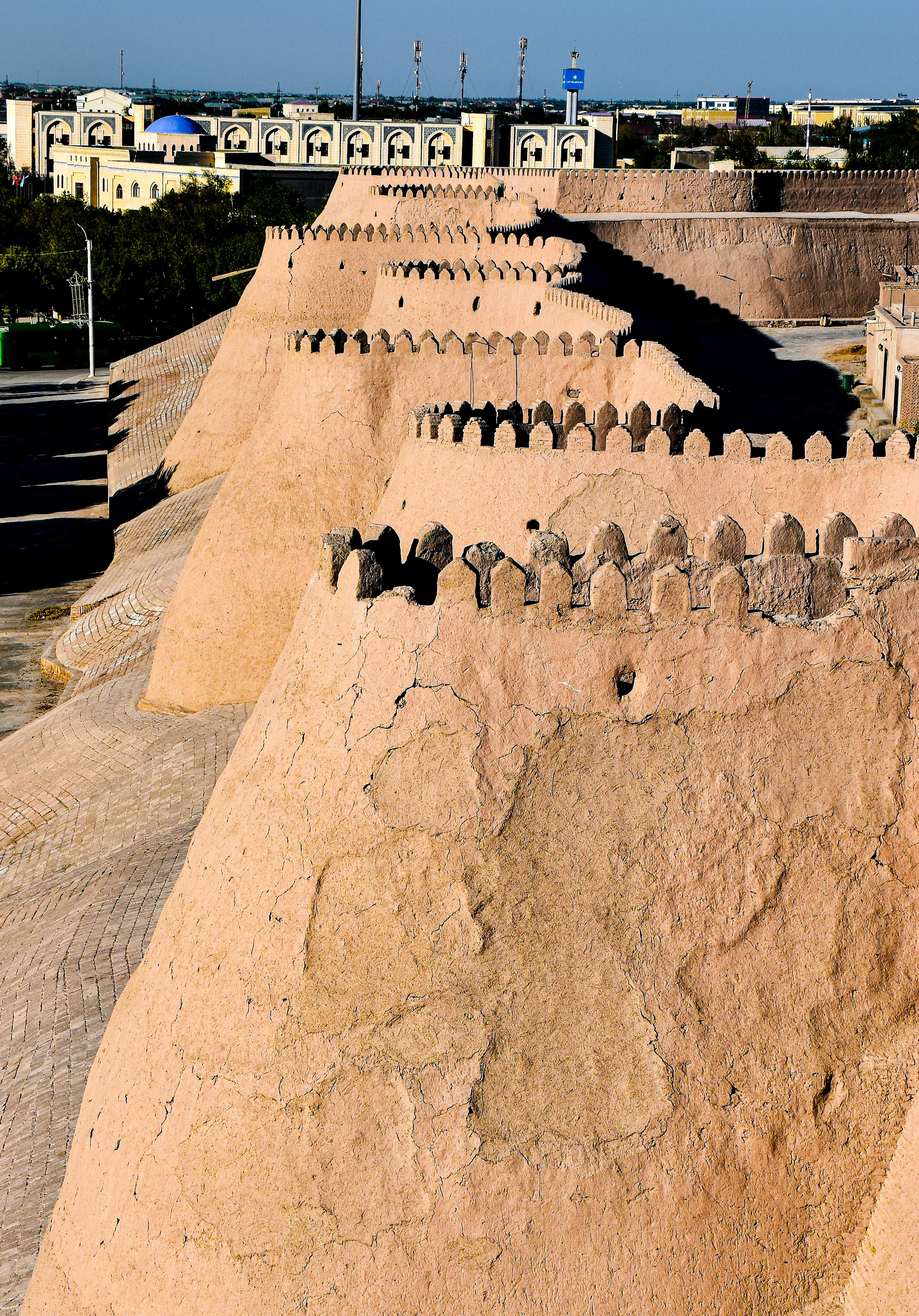
Culture:
History and Traditions
Uzbekistan’s cultural heritage dates back to the ancient Sogdians, who inhabited the region over 2,500 years ago. The country’s strategic location on the Silk Road made it an important center for trade, commerce, and cultural exchange between East and West. As a result, Uzbekistan’s culture has been influenced by various civilizations, including the Persians, Arabs, Mongols, and Russians.
Uzbekistan’s traditions are deeply rooted in its Islamic heritage, with many customs and practices influenced by Islamic law and tradition. The country’s cultural identity is also shaped by its nomadic past, with many traditions and customs reflecting the country’s history as a major center for trade and commerce.
Art and Architecture
Uzbekistan’s art and architecture are renowned for their beauty and grandeur. The country’s ancient cities, such as Samarkand, Bukhara, and Khiva, are home to some of the most impressive architectural monuments in the Islamic world, including the Registan Square, the Bibi-Khanym Mosque, and the Itchan Kala Fortress.
Uzbekistan’s traditional art forms include miniature painting, ceramics, and textiles. The country’s artisans are famous for their intricate designs and patterns, which are often used to decorate traditional clothing, carpets, and other handicrafts.
Music and Dance
Uzbekistan’s music and dance traditions are an integral part of its cultural heritage. The country’s traditional music is characterized by the use of traditional instruments, such as the tar, the tanpura, and the surnay. Uzbekistan’s traditional dances, such as the tanovar and the shashmaqom, are highly stylized and often performed during special occasions and celebrations.
Literature
Uzbekistan has a rich literary heritage, with many famous writers and poets contributing to the country’s cultural landscape. The country’s literature is characterized by its use of traditional forms, such as the epic poem and the ghazal, as well as modern forms, such as the novel and the short story.
Customs and Etiquette
Uzbekistan’s customs and etiquette are deeply rooted in its Islamic heritage and nomadic past. The country’s traditional customs include:
- Guest Culture: In Uzbekistan, guests are considered sacred, and hosts will often go to great lengths to ensure their comfort and satisfaction.
- Respect for Elders: Older people are highly respected in Uzbekistan, and children are taught from a young age to show respect and deference to their elders.
- Hospitality: Uzbekistan is famous for its hospitality, with guests often being treated to traditional food, drink, and entertainment.
- Dress Code: Uzbekistan is a conservative country, and visitors are expected to dress modestly, covering their shoulders and knees.
Festivals and Celebrations
Uzbekistan celebrates many festivals and holidays throughout the year, including:
- Navroz: The traditional Uzbek New Year, celebrated on March 21st.
- Eid al-Fitr: The Islamic holiday marking the end of Ramadan, the holy month of fasting.
- Eid al-Adha: The Islamic holiday commemorating the willingness of the Prophet Ibrahim to sacrifice his son.
- Independence Day: Celebrated on August 31st, marking Uzbekistan’s independence from the Soviet Union.
Modern Culture
Uzbekistan’s modern culture is a blend of traditional and modern influences. The country’s young people are increasingly influenced by Western culture, with many embracing modern music, fashion, and technology. However, traditional culture remains an important part of Uzbekistan’s identity, with many young people continuing to practice traditional customs and traditions.
Challenges and Opportunities
Uzbekistan’s cultural heritage faces several challenges, including:
- Preservation of Traditional Culture: The country’s traditional culture is under threat from modernization and globalization.
- Cultural Exchange: Uzbekistan’s cultural exchange programs are limited, making it difficult for the country’s artists, musicians, and writers to share their work with the world.
- Tourism: Uzbekistan’s tourism industry is growing, but the country’s cultural heritage is often overlooked in favor of more commercial attractions.
Accommodations:
Tashkent Region
- Topchan Hostel: A social hostel with dorms and private rooms, starting from $5 per night. (tashkent, Mirzo Ulugbek district)
- Old City Hostel: A cozy hostel with dorms and private rooms, starting from $6 per night. (tashkent, Old City)
- Tashkent Hostel: A basic hostel with dorms and private rooms, starting from $4 per night. (tashkent, Center)
Samarkand Region
- Samarqand Hostel: A modern hostel with dorms and private rooms, starting from $7 per night. (Samarkand, Center)
- Old Town Hostel: A traditional hostel with dorms and private rooms, starting from $6 per night. (Samarkand, Old Town)
- Registan Hostel: A social hostel with dorms and private rooms, starting from $5 per night. (Samarkand, Registan Square)
Bukhara Region
- Bukhara Hostel: A cozy hostel with dorms and private rooms, starting from $6 per night. (Bukhara, Old City)
- Kalyan Hostel: A traditional hostel with dorms and private rooms, starting from $5 per night. (Bukhara, Kalyan Minaret)
- Ark Hostel: A basic hostel with dorms and private rooms, starting from $4 per night. (Bukhara, Ark Fortress)
Khiva Region
- Khiva Hostel: A social hostel with dorms and private rooms, starting from $7 per night. (Khiva, Itchan Kala Fortress)
- Old Town Hostel: A traditional hostel with dorms and private rooms, starting from $6 per night. (Khiva, Old Town)
- Tash Hauli Hostel: A cozy hostel with dorms and private rooms, starting from $5 per night. (Khiva, Tash Hauli Palace)
Fergana Valley Region
- Fergana Hostel: A modern hostel with dorms and private rooms, starting from $6 per night. (Fergana, Center)
- Kokand Hostel: A traditional hostel with dorms and private rooms, starting from $5 per night. (Kokand, Center)
- Margilan Hostel: A basic hostel with dorms and private rooms, starting from $4 per night. (Margilan, Center)
Kyzylkum Desert Region
- Desert Hostel: A unique hostel with dorms and private rooms, starting from $7 per night. (Kyzylkum Desert, near Yangikazgan)
- Yurt Camp: A traditional yurt camp with shared facilities, starting from $5 per night. (Kyzylkum Desert, near Aydarkul Lake)
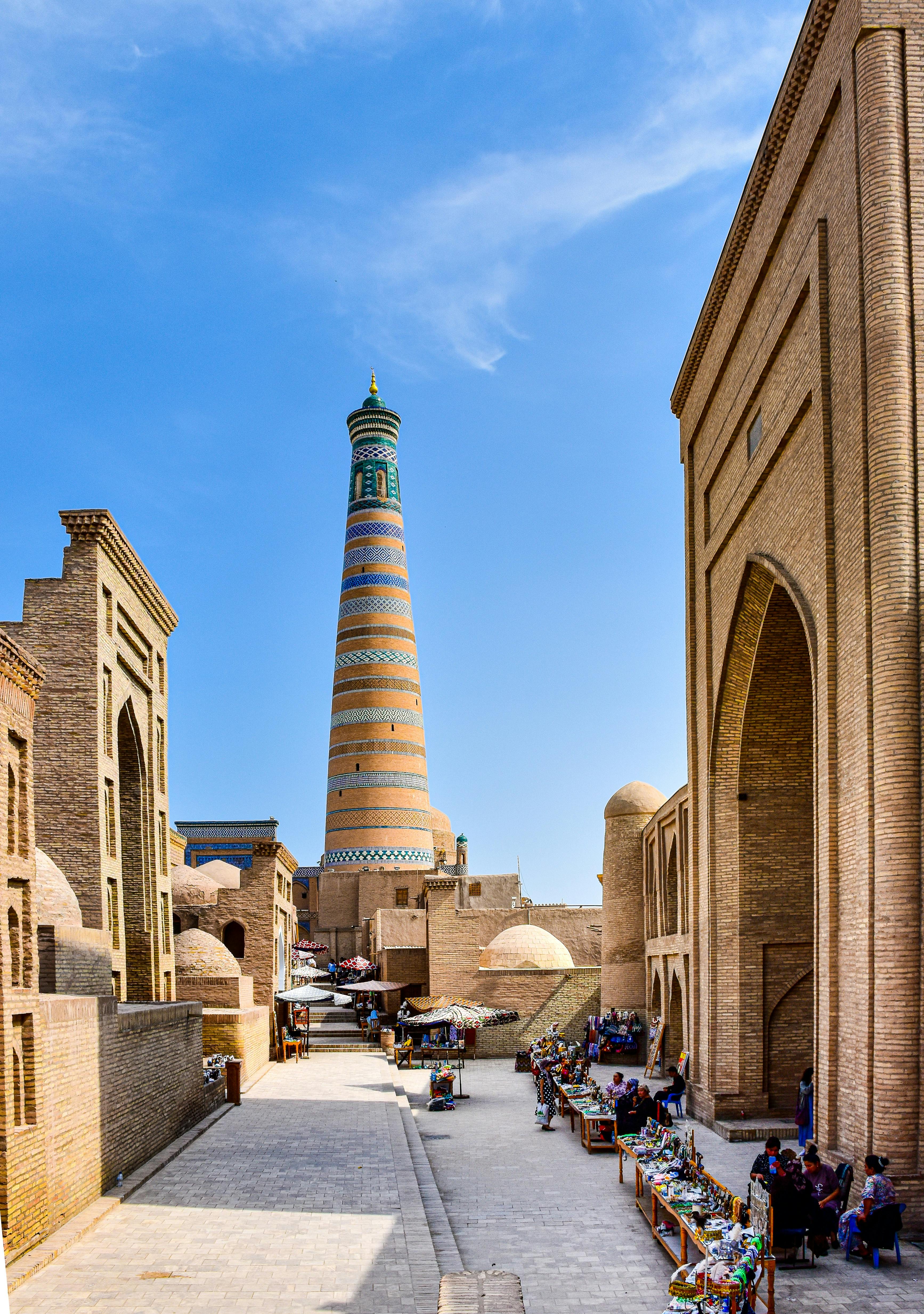
Nightlife:
Nightlife in Uzbekistan is still at the very developing stage, but it owns a very interesting and weird mix of traditional and modern facilities for resting. The country’s capital is far out the center of nightlife, with its modern lineup of clubs, bars, and live music spots.
From folk songs and dances, through to modern electronic and DJs-everything can be found in Tashkent. Most of the city nightlife is still concentrated downtown, where clubs and bars pop up literally on every corner: Club 13 and The Pub are two such places that would introduce you both to local and foreign performers.
Another big city within Uzbekistan is Samarkand, and it also lives in the night with its modern clubs and bars. There is live music and a place to dance around Registan Square, while the Samarkand Club is a good spot to experience vibrant nightlife.
Nightlife in these two ancient cities of Uzbekistan is much more laid back. Both Bukhara and Khiva have traditional tea houses and bars where one can have a quiet drink with soft music playing in the background. The Old City Bar in Bukhara and The Caravanserai in Khiva are great places for experiencing the nightlife of these two cities.
Nightlife in the Fergana Valley is very low-key, with an emphasis on traditional music and dance performances. Modern clubs and bars exist in the city of Fergana, but generally speaking, nightlife is rather more subdued than in Tashkent or Samarkand.
Challenges and Opportunities
Uzbekistan’s nightlife scene faces several challenges, including:
- Limited options: Compared to other countries, Uzbekistan’s nightlife scene is still relatively limited, with a lack of options in smaller cities and towns.
- Conservative culture: Uzbekistan is a conservative country, and the nightlife scene is often subject to strict regulations and censorship.
Despite these challenges, Uzbekistan’s nightlife scene is slowly developing, with new clubs, bars, and live music venues opening up in major cities. The country’s unique blend of traditional and modern culture makes it an exciting place to experience nightlife.
Tips and Recommendations
- Dress modestly: Uzbekistan is a conservative country, so it’s best to dress modestly when going out at night.
- Respect local customs: Be respectful of local customs and traditions, particularly in smaller cities and towns.
- Explore local nightlife: Don’t be afraid to try new things and explore local nightlife, including traditional tea houses and bars.
Backpacking Uzbekistan costs:
Daily Budget
- Accommodation: $5-10 per night (hostel dorm or budget guesthouse)
- Food: $3-5 per meal (street food, markets, or budget restaurants)
- Transportation: $1-3 per ride (marshrutkas, buses, or taxis)
- Attractions: $1-2 per person (museums, historical sites, or cultural events)
- Other expenses: $2-5 per day (souvenirs, snacks, or miscellaneous expenses)
Total daily budget: $12-25
Weekly Budget
- Accommodation: $35-70 per week (hostel dorm or budget guesthouse)
- Food: $21-35 per week (street food, markets, or budget restaurants)
- Transportation: $7-21 per week (marshrutkas, buses, or taxis)
- Attractions: $7-14 per week (museums, historical sites, or cultural events)
- Other expenses: $14-35 per week (souvenirs, snacks, or miscellaneous expenses)
Total weekly budget: $84-175
The Republic of Uzbekistan, displays a great history, culture, and eye-catching natural beauty. From Samarkand’s grand architecture to Tashkent’s bustling markets, this country will really captivate you with its fascination and inspiration.
From its rich cultural heritage to delicious food and hospitable people, Uzbekistan is the ideal destination for every traveler who seeks an off-the-beaten-path adventure. Be it an enthusiast of history, a foodie, or an adventure-seeker, Uzbekistan has something to offer.
In this blog, we shared the must-visit places, activities one can engage in, and ways of experiencing the real culture of Uzbekistan. We have also provided some recommendations and tips on traveling with low expenses from affordable accommodation options to transportation and attractions that fit your budget.
Plan your trip to Uzbekistan by being open-minded, curious, and respectful of its culture. Be sure to try new food, learn a few words in Uzbek, and interact with locals, who are very friendly.
With surprises and delights waiting around every bend, Uzbekistan is a country that brims with unique cultural combinations of tradition and modernity, fabulous architecture, and breathtaking natural beauty-a place that will hold unforgettable memories.
